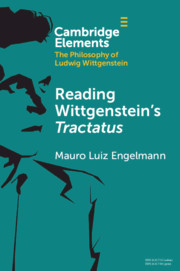Refine search
Actions for selected content:
5 results
Chapter 6 - Solipsism and the Self
-
-
- Book:
- Wittgenstein's <I>Tractatus Logico-Philosophicus</I>
- Published online:
- 07 March 2024
- Print publication:
- 14 March 2024, pp 110-124
-
- Chapter
- Export citation
Chapter 9 - ‘Normal Connections’ and the Law of Causality
-
-
- Book:
- Wittgenstein's <I>Tractatus Logico-Philosophicus</I>
- Published online:
- 07 March 2024
- Print publication:
- 14 March 2024, pp 166-186
-
- Chapter
- Export citation

Reading Wittgenstein's Tractatus
-
- Published online:
- 29 June 2021
- Print publication:
- 29 July 2021
-
- Element
- Export citation
7 - Wittgenstein and the linguistic turn
-
-
- Book:
- Wittgenstein's <I>Philosophical Investigations</I>
- Published online:
- 06 July 2010
- Print publication:
- 13 May 2010, pp 129-144
-
- Chapter
- Export citation
1 - From referentialism to human action: the Augustinian theory of language
-
-
- Book:
- Wittgenstein's <I>Philosophical Investigations</I>
- Published online:
- 06 July 2010
- Print publication:
- 13 May 2010, pp 11-29
-
- Chapter
-
- You have access
- Export citation
